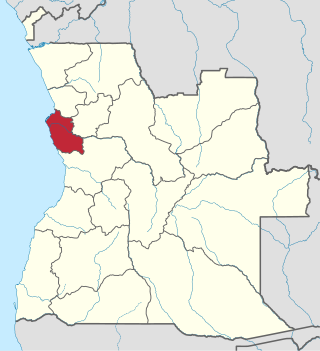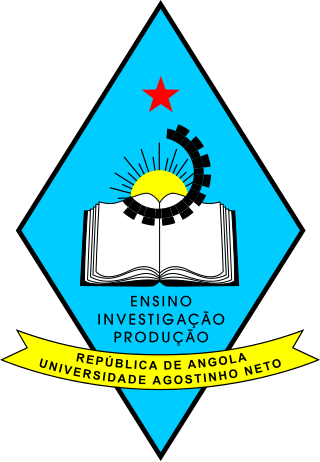
Angola, officially the Republic of Angola, is a country located on the west-central coast of Southern Africa. It is the second-largest Lusophone (Portuguese-speaking) country in both total area and population, and is the seventh-largest country in Africa. It is bordered by Namibia to the south, the Democratic Republic of the Congo to the north, Zambia to the east, and the Atlantic Ocean to the west. Angola has an exclave province, the province of Cabinda, that borders the Republic of the Congo and the Democratic Republic of the Congo. The capital and most populous city is Luanda.

Luanda is the capital and largest city in Angola. It is Angola's primary port, and its major industrial, cultural and urban centre. Located on Angola's northern Atlantic coast, Luanda is Angola's administrative centre, its chief seaport, and also the capital of the Luanda Province. Luanda and its metropolitan area is the most populous Portuguese-speaking capital city in the world and the most populous Lusophone city outside Brazil, with over 8.3 million inhabitants in 2020.

Bengo is a province of Angola. Its capital is Caxito. It has an area of 31,371 square kilometres, and its population as of the 2014 Census was 356,641. The province was created in 1980 by dividing the original province of Luanda into Bengo and a new smaller province of Luanda.

Luanda is a province of Angola. It covers an area of 18,835 km2, and had a population of 6,945,386 at the Census of 16 May 2014. The latest official estimate is 8,247,688.

Lubango, formerly known as Sá da Bandeira, is a municipality in Angola, capital of the Huíla Province, with a population of 914,456 in 2022. The city center had a population of 600,751 in 2014 making it the second-most populous city in Angola after the capital city Luanda.
Angolan Portuguese is a group of dialects and accents of the Portuguese language used mostly in Angola, where it is an official language. In 2005 it was used there by 60% of the population, including by 20% as their first language. The 2016 CIA World Fact Book reports that 12.3 million, or 47% of the population, speaks Portuguese as their first language. However, many parents raise their children to speak only Portuguese. The 2014 census found that 71% speak Portuguese at home, many of them alongside a Bantu language, breaking down to 85% in urban areas and 49% in rural areas.

N'dalatando, formerly Vila Salazar, is a town, with a population of 161,584 (2014), and a commune in the municipality of Cazengo, province of Cuanza Norte, Angola.

Girabola, or Campeonato Nacional de Futebol em Séniores Masculinos, is the top division of Angolan football. It is organized by the Angolan Football Federation.

The Agostinho Neto University is the largest public university of Angola, based in Luanda and in the nearby city of Talatona, in Angola. In the academic year 2005–06, 68 licensing courses were ministered by the university: 18 in Bachelor's and 15 in master's degrees, involving areas of scientific knowledge in the faculties, institutes, and higher learning schools. It is one of seven public universities in Angola. Until 2009 the Agostinho Neto University was the country's only public university, and had campuses in all its major cities. In 2009 it was split up, with its campuses outside Luanda becoming six autonomous universities, located in Benguela, Cabinda, Huambo, Lubango, Malange, and Uíge. Agostinho Neto University is now one of the seven regional university among others, serving Luanda Province and Bengo Province. It remains the largest university in Angola.

Miguel António de Melo, a nobleman, colonial administrator and the 1st Count of Murça. He was young nobleman who exercised a position in the Royal court of Portugal, 14th Lord of Murça and Castro Daire, squire of Figueira, commander of Santa Maria de Freixas in the Order of Christ and honorary member of the Royal Academy of Sciences, in addition to holding several political offices, including that of governor and captain-general of Angola, minister and peer of the realm, appointed to a commission, by King John VI of Portugal, to draft a constitution for Portugal, minister and peer of the realm.

Isabel dos Santos is an Angolan businesswoman, the eldest child of Angola's former President José Eduardo dos Santos, who ruled the country as a dictator from 1979 to 2017. Once considered Africa's richest woman according to Forbes magazine, with a net worth exceeding US$2 billion, she was dropped from the magazine's list in January 2021 after the freezing of her assets in Angola, Portugal and the Netherlands. She owes $340 million to the Portuguese company PT Ventures.

Ícolo e Bengo is a city council in the province of Luanda in Angola. It had a population of 81,144 in 2014.

Ilha do Cabo typically known as Ilha de Luanda is a spit off the shore of Luanda, the capital of Angola, a country on the continents' southwestern coast. It consists of a low sandy strip formed by sedimentation. In administrative terms, the peninsula belongs to the municipality of Ingombota in the Luanda Province.
Quilamba Quiaxi, also spelled as Kilamba Kiaxi, is a city and one of nine municipalities that make up the province of Luanda in Angola. In the Kimbundu language the name means Land (Kiaxi) of Kilamba.
The Taça de Angola is an annual basketball competition in which all Angolan basketball clubs are eligible to contest. The tournament, played in a knock-out system, is Angola's second most important basketball competition following the national league.
The following is a timeline of the history of the city of Luanda, Angola.

The Supertaça de Angola, better known as the Supertaça Vladimiro Romeiro, is a single-match competition in Angolan basketball, played between the Angolan league champion and the Angola Cup winner of the previous season. In case the same team happens to win both the league and the cup, the match will be played between the league winner and the cup runner-up.

The Ministry of Science and Technology is a cabinet-level ministry of the government of Angola. The mission of the ministry is to "Propose and coordinate the implementation of policies in the field of Science, Technology and Innovation, as well as their modes of organization, operation and evaluation." The current Minister of Science and Technology is Maria Cândida Teixeira.
Eugenio César Laborinho is an Angolan Lieutenant General and politician of the People's Movement for the Liberation of Angola (MPLA); Governor of Cabinda Province; Minister of Interior of Angola since 2019.














